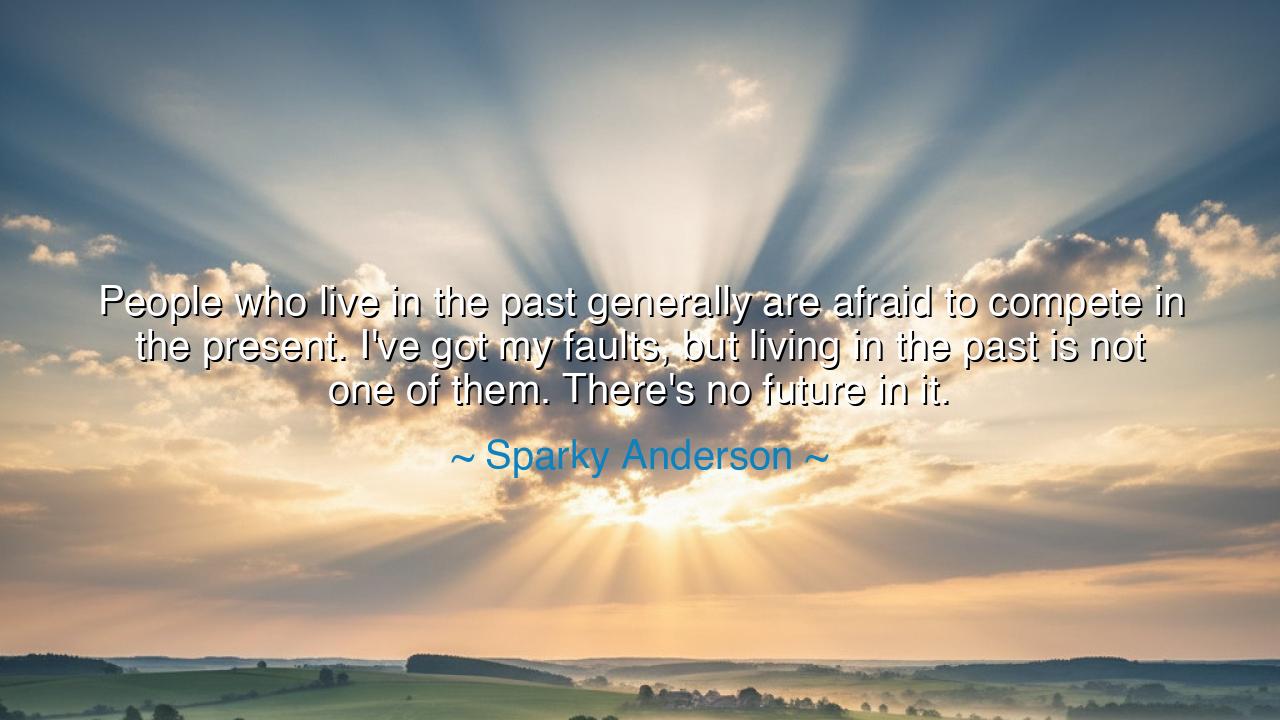
People who live in the past generally are afraid to compete in
People who live in the past generally are afraid to compete in the present. I've got my faults, but living in the past is not one of them. There's no future in it.






"People who live in the past generally are afraid to compete in the present. I've got my faults, but living in the past is not one of them. There's no future in it." – Sparky Anderson.
In this quote, Sparky Anderson offers a powerful reminder that progress can only be made when we let go of the past and engage fully with the present. To live in the past is to be shackled by memories and experiences that no longer serve us, hindering our ability to rise to the challenges of the present. Anderson's declaration is a call to face the future head-on, to leave behind the comfort of nostalgia and take up the mantle of action in the now. For him, the future is not something that can be shaped by the past—it is shaped by the choices and efforts we make in the present.
The ancient Greeks understood the power of the present moment and the danger of dwelling too much on the past. Heraclitus, the philosopher of change, famously said, “You cannot step into the same river twice.” His teachings emphasized the importance of living in the moment, recognizing that the world around us is in a constant state of flux. To live in the past, Heraclitus would argue, is to ignore the ever-changing nature of existence. Anderson’s message aligns with this ancient wisdom, suggesting that clinging to the past can prevent us from adapting to the challenges and opportunities of today.
Consider the warrior mindset of the ancient Samurai. In their teachings, warriors were taught to leave the past behind, to not dwell on former victories or defeats, and to approach each battle with a fresh perspective. This was not a denial of history, but an acknowledgment that the present moment is where all action occurs. To win the future, the Samurai believed one must be fully engaged with the now, unburdened by the weight of previous triumphs or mistakes. Anderson echoes this sentiment by reminding us that there is no future in the past. Success lies in how we choose to approach the present, free from the confines of yesterday’s glory or failure.
A powerful example of this principle can be seen in the life of Thomas Edison, who failed thousands of times before successfully inventing the lightbulb. If Edison had remained focused on his previous failures, he might have given up long before achieving his goal. Instead, he adopted the mindset of the present, viewing each failure as a step toward eventual success. His success was built not on the glory of past achievements but on the constant pursuit of innovation and problem-solving in the moment. Edison’s ability to leave the past behind and focus on the future is a perfect illustration of Anderson’s belief that there is no future in dwelling on the past.
In life, many of us are prone to retreat into the comfort of the past, whether through memories of better times or lingering on past failures. Yet, regret and nostalgia can be traps that prevent us from fully embracing the present. Marcus Aurelius, the Stoic emperor, wrote in his Meditations: “Do not waste time on what you cannot control.” For Aurelius, this meant releasing attachment to the past—whether it be former successes or failures—and focusing on what could be controlled in the present moment. The Stoics, like Anderson, believed that true power lies in the ability to act decisively in the now, rather than being bogged down by the chains of past thoughts or regrets.
The lesson from Sparky Anderson and the ancient philosophers is clear: in order to build a future, we must focus on the present. To dwell on past glories or mistakes is to miss the opportunity that lies before us. Whether in sports, business, or personal growth, success comes not from repeating the past, but from embracing the opportunities of the moment. Just as Anderson rejected living in the past, we too must learn to move forward, to release the hold of nostalgia and regret, and to act boldly in the present.
In our own lives, we can take Anderson’s wisdom to heart by reflecting on the power of the present. Are we letting the past dictate our actions today? Are we so focused on what we’ve lost or what we’ve accomplished that we forget to engage with what’s happening right now? To truly make progress, we must practice mindfulness—focusing our energy on the opportunities and challenges before us, while leaving behind the weight of the past. Let us, like Edison and the Stoics, adopt a forward-focused mindset, recognizing that the future is created through the actions we take today.






AAdministratorAdministrator
Welcome, honored guests. Please leave a comment, we will respond soon